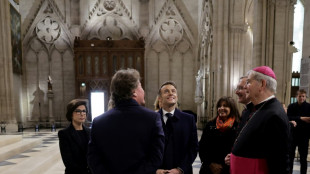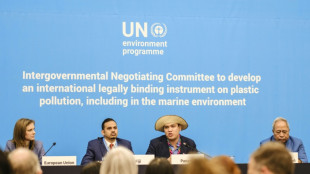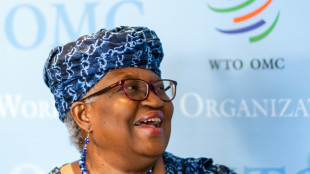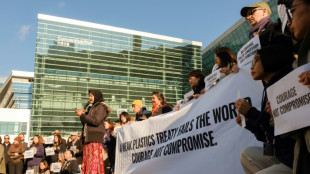
-
 Global wine output to hit lowest level since 1961
Global wine output to hit lowest level since 1961
-
Norris boosts McLaren title hopes with sprint pole

-
 Romania recounts presidential ballots as parliamentary vote looms
Romania recounts presidential ballots as parliamentary vote looms
-
French skipper Dalin leads as Vendee Globe passes Cape of Good Hope

-
 Chelsea not in Premier League title race, says Maresca
Chelsea not in Premier League title race, says Maresca
-
Brazil's Bolsonaro aims to ride Trump wave back to office: WSJ

-
 France requests transfer of death row convict held in Indonesia: minister
France requests transfer of death row convict held in Indonesia: minister
-
'Mamie Charge': Migrants find safe haven in Frenchwoman's garage

-
 Iconic Uruguayan ex-leader hails country's swing left as 'farewell gift'
Iconic Uruguayan ex-leader hails country's swing left as 'farewell gift'
-
Shared experiences make Murray 'perfect coach', says Djokovic

-
 Iran, Europeans to keep talking as tensions ratchet up
Iran, Europeans to keep talking as tensions ratchet up
-
Inflation-wary US consumers flock to 'Black Friday' deals

-
 France shows off restored Notre Dame after 'impossible' restoration
France shows off restored Notre Dame after 'impossible' restoration
-
South African bowlers strike after Sri Lanka set big target

-
 Namibia reopens polls after election chaos in ruling party test
Namibia reopens polls after election chaos in ruling party test
-
Georgia police arrest dozens in clashes with pro-EU protesters

-
 Leclerc on top for Ferrari in Qatar GP practice
Leclerc on top for Ferrari in Qatar GP practice
-
Amorim puts faith in Mount to turn around Man Utd career

-
 Guardiola will not 'run' from Man City rebuild
Guardiola will not 'run' from Man City rebuild
-
Assisted dying campaigners, opponents rally at UK parliament

-
 Durable prop Healy set to carve name in Irish rugby history
Durable prop Healy set to carve name in Irish rugby history
-
Macron unveils Notre Dame after 'impossible' restoration

-
 Traumatised Spain marks one month since catastrophic floods
Traumatised Spain marks one month since catastrophic floods
-
Attack-minded Spurs boss Postecoglou says: 'You'll miss me when I'm gone'

-
 Syria jihadists, allies shell major city Aleppo in shock offensive
Syria jihadists, allies shell major city Aleppo in shock offensive
-
Macron inspects 'sublime' Notre Dame after reconstruction

-
 Arsenal must be near-perfect to catch Liverpool, says Arteta
Arsenal must be near-perfect to catch Liverpool, says Arteta
-
Arrests, intimidation stoke fear in Pakistan's politics

-
 Showdown looms on plastic treaty days before deadline
Showdown looms on plastic treaty days before deadline
-
Ngozi Okonjo-Iweala: the WTO's trailblazing motivator

-
 British MPs debate contentious assisted dying law
British MPs debate contentious assisted dying law
-
Macron offers first glimpse of post-fire Notre Dame

-
 Syria jihadists, allies shell Aleppo in shock offensive
Syria jihadists, allies shell Aleppo in shock offensive
-
Japan government approves $92 bn extra budget

-
 Toll in Syria jihadist-army fighting rises to 242: monitor
Toll in Syria jihadist-army fighting rises to 242: monitor
-
UK transport secretary quits in setback for Starmer

-
 Days before deadline, plastic treaty draft highlights disagreement
Days before deadline, plastic treaty draft highlights disagreement
-
Crypto boss eats banana art he bought for $6.2 million

-
 Teen news boss criticises Australian social media ban
Teen news boss criticises Australian social media ban
-
Taiwan detects 41 Chinese military aircraft, ships ahead of Lai US stopover

-
 Spain urged to 'build differently' after deadly floods
Spain urged to 'build differently' after deadly floods
-
WTO chief faces heavy task as Trump threat looms

-
 Herbert takes control at Australian Open as Smith tanks
Herbert takes control at Australian Open as Smith tanks
-
Israel PM again warns Iran after top diplomat talks of revising nuclear doctrine

-
 Brilliant Brook's 132 puts England on top against New Zealand
Brilliant Brook's 132 puts England on top against New Zealand
-
US landmine offer to Ukraine throws global treaty into 'crisis': campaign group

-
 Singapore hangs 4th person in three weeks
Singapore hangs 4th person in three weeks
-
Five things to know about NewJeans' shock split from agency

-
 Waste pickers battle for recognition at plastic treaty talks
Waste pickers battle for recognition at plastic treaty talks
-
Ireland votes in closely fought general election


UEFA changing angle of attack with revised fair play rules
With many clubs reeling from the financial fallout of the pandemic and competitive inequality growing despite existing fair play rules, UEFA will on Thursday unveil changes in its tactics for levelling European football's economic playing field.
After months of discussions, UEFA is expected to adopt an overhaul of the Financial Fair Play (FFP) system introduced in 2010 to stop clubs piling up debts in their pursuit of trophies.
The focus will change from requiring clubs to balance their books to curbing spending on salaries, transfer fees and agent commissions.
The change of approach could make clubs more attractive to potential investors by putting a fixed limit on costs, Raffaele Poli, head of the CIES soccer observatory in Neuchatel, told AFP.
"You can inject new money, but you mustn't burn it all in recruitment and salaries," he said.
"Even the big clubs are victims of this salary inflation, while feeding it."
In 12 years, FFP has persuaded many clubs to clean up their accounts, but its limitations have become clear.
Super-rich owners who are not interested in profits, led by state-held Manchester City and Paris Saint-Germain, have found ways to inflate the income of their clubs.
On the other hand, as the Covid pandemic cost European football about seven billion euros over two seasons, FFP left poorer clubs with little room to manoeuvre.
To avoid a wave of bankruptcies, UEFA relaxed its deficit rules in 2020, and then announced an overhaul of FFP.
The plan combines strategies used by North American sports.
The biggest of those, the National Football League, has only 32 clubs, all in the United States, and negotiates with a single player union.
UEFA, on the other hand, has 55 member countries with well over 1,000 clubs and must contend with EU and national labour and competition laws.
That makes the "hard" salary cap used by most North American leagues impractical.
- 'Luxury tax' -
Even so, while UEFA plans to double the permitted deficit over three years (to 60 million euros), it will oblige clubs to limit wage bills. The ceiling will drop as current contracts expire: 90 percent of club income in 2023-2024, dropping to 70 percent from 2025-2026.
UEFA also plans to borrow from the "luxury tax" used by Major League Baseball.
Clubs who overspend will be fined a percentage of the overrun. The money will be redistributed among the more virtuous clubs.
Since the wealthiest clubs may not be deterred by financial penalties, UEFA's plan includes signing bans, loan restrictions, demotions from one European competition to another and penalty points in the "mini-league" competitions that will replace the group stages in European competitions from 2024.
Poli says the plan gives even the rich clubs clarity.
"Investors gain predictability: they can put a figure on their budget if they choose to spend beyond the salary cap," he said, adding that they will be able to brandish the new rules "in the face of the excessive demands" of players and agents.
Yet the new rules will not stop clubs with unlimited backing if they wish to continue to flex their financial muscle.
The debt ceiling means members of the old elite, such as Barcelona and Juventus, who have overspent trying to keep up and who showed their desperation by their support of the Super League plan, could continue to struggle to compete.
P.Queiroz--PC
